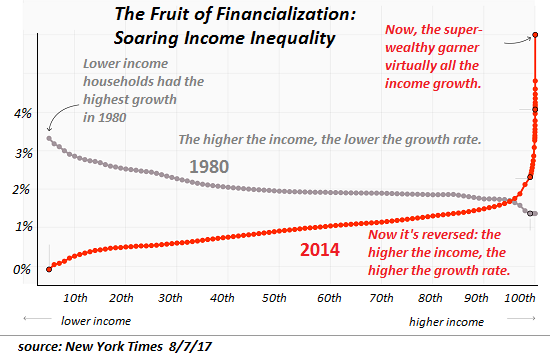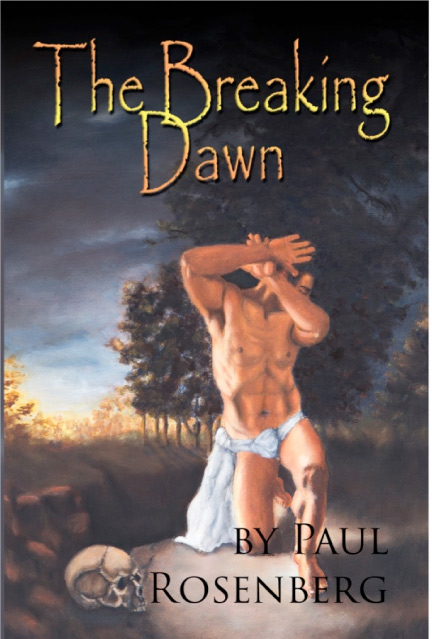 Paul Rosenberg - Freeman**Q**s Perspective
Paul Rosenberg - Freeman**Q**s Perspective
IPFS
4 TRUTHS ABOUT THE 1%
Written by Paul Rosenberg Subject: Economic Theory I don't particularly like the phrase, "the one percent." It reeks of envy and thus of socialism. But at the same time, the wealthiest people in the West really have become much wealthier in the past decade or two, while working people have, perhaps, stayed even. That's a legitimate issue, regardless of the unfortunate terminology.
I don't particularly like the phrase, "the one percent." It reeks of envy and thus of socialism. But at the same time, the wealthiest people in the West really have become much wealthier in the past decade or two, while working people have, perhaps, stayed even. That's a legitimate issue, regardless of the unfortunate terminology.
The roots of this go back to the changes of the 1980s, when the financialization of the US economy took hold[1]. It's crucial to understand that the Wall Street complex thrives on the skim: moving money from place to place to place and taking a percentage each time. This is not productive. Rather, it absorbs the fruits of production. As of 2016, that skim was a significant percentage of the US gross domestic product. (It was 7.3% for finance and insurance combined, so a guess of 5% for Wall Street may be close.)
In the end, that means that some trillion dollars per year is skimmed from the US economy by Wall Street and related businesses. These outfits provide some services, to be sure, but have you noticed that nearly 100% of all retirement money in the US is now channeled through Wall Street? That didn't happen by accident; it happened because legislation and regulations made it happen.
I'm simplifying here but not unfairly. And I'm not willing to turn away from the truth just because it's hidden behind complexity.
Here's a graph[2] showing the difference between 1980 and 2014:

Since 2008 this process has become much worse, because of central bank actions (including massive asset buys and their zero interest rate policy) and corporate stock buybacks. So much so that projections show that the richest 1% will control nearly two-thirds of the world's money by 2030. That's not a healthy situation.
Four Truths
Given these facts, I'd like to express some important facts about this situation:
#1: This is because the system is rigged.
The status quo system is clearly rigged, and it had to be for the system to continue without a painful reset of some kind. Especially since 2008, the system needed more tax income and lower interest on its debt burden and to keep the populace acquiescent with a general prosperity. A reset would have been bad for the banks, bad for the corporations, and bad for the politicians.
And the rigging delivered. With income going to the richest, the state gathered more money from the higher tax brackets. With stock and bond prices soaring, those high-end taxpayers were quite content to pay. The banks got free money, taking loans from the Fed at 0.25% or less, then put the money into Treasuries at 3%. Politicians were better funded than ever before too.
It was an era of easy money for the high end of the economy. But more important than that, it was a time of mass compliance and thus an era of mega-government.
#2: Any other "class" would have done likewise… and has done likewise.
Dividing people into classes is misleading at best, but since we've started with "the one percent," we're more or less locked into that model. And so, with apologies, we will continue with it.
The upper class has clearly cashed in on the rigging of the US economy, and the middle and lower classes have clearly lagged behind. Behind all the self-congratulatory unemployment figures, for example, there are 90-some million Americans who aren't even considered "in the workforce," not to mention millions on welfare and disability programs.
But it's also very clear that if the lower or middle classes had been given an opportunity to leap ahead at the expense of the others, they would have done so too. In fact, the middle class did exactly that in the 1950s.
Because of labor laws and a variety of regulations and court rulings, labor unions were able to wield massive power in the post-World War II years. There were huge numbers of ignorant and not particularly hardworking guys riding around in luxury cars, with big boats or RVs parked next to their houses.
So, calling the one percent evil, or even culpable, is a stretch. Certainly some small number of them are, but most have simply been getting ahead because they could.
#3: Envy and retribution is the path to barbarism and death.
A lot of the people who talk about "the one percent" seek to stir up envy, anger, and hate. They want a mass of angry people who will bring them into power. Please understand: This is the path to death and degradation.
"Getting them back" is something we should have gotten over in childhood; in adulthood it leads to "charismatic" leaders and piles of corpses.
Sure, we all get angry sometimes. But we are not children anymore, and simply lashing out is both childish and barbaric. These are precisely the kinds of emotions that bypass reason and empower monsters.
And as in the Soviet Union, those who empower the monster will also be its victims. Whatever you empower the big man to build will be turned against you.
#4: The solution is to walk away from the rigged system.
You never have any power in a negotiation unless you're prepared to walk away from it. Likewise, if you're not ready to walk away from the status quo – to be called weird and to be disliked – you have no power to change anything. The best you can do is hope that a politician will somehow respond to your whining.
What works is to turn your back on the status quo and start building better systems. And it's just about the only thing that has ever worked.
So, pick a spot and start building a better world. But don't talk… act. Unless and until you act, you remain inert, no matter how much you talk.
Break out of your inertia. Get up and start doing.
* * * * *
A book that generates comments like these, from actual readers, might be worth your time:
I just finished reading The Breaking Dawn and found it to be one of the most thought-provoking, amazing books I have ever read… It will be hard to read another book now that I've read this book… I want everyone to read it.
Such a tour de force, so many ideas. And I am amazed at the courage to write such a book, that challenges so many people's conceptions.
There were so many points where it was hard to read, I was so choked up.
Holy moly! I was familiar with most of the themes presented in A Lodging of Wayfaring Men, but I am still trying to wrap my head around the concepts you presented at the end of this one.
Get it at Amazon ($18.95) or on Kindle: ($5.99)
* * * * *
Paul Rosenberg
www.freemansperspective.com

























